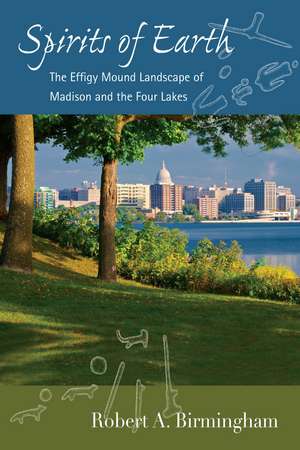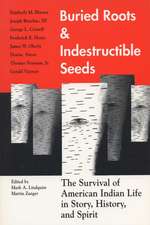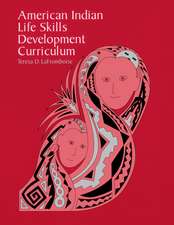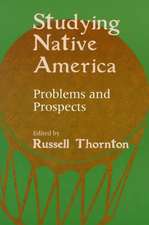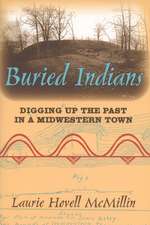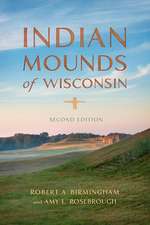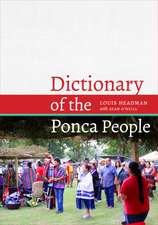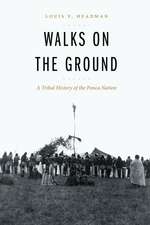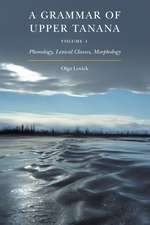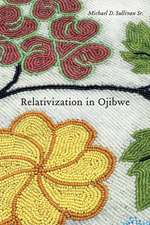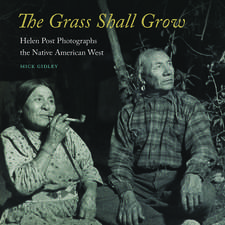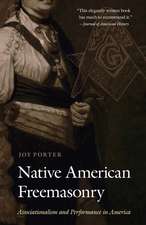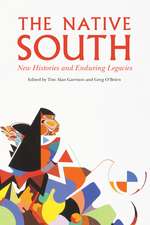Spirits of Earth: The Effigy Mound Landscape of Madison and the Four Lakes: Wisconsin Land and Life
Autor Robert A. Birminghamen Limba Engleză Paperback – 18 dec 2009
Between A.D. 700 and 1100 Native Americans built more effigy mounds in Wisconsin than anywhere else in North America, with an estimated 1,300 mounds—including the world’s largest known bird effigy—at the center of effigy-building culture in and around Madison, Wisconsin. These huge earthworks, sculpted in the shape of birds, mammals, and other figures, have aroused curiosity for generations and together comprise a vast effigy mound ceremonial landscape. Farming and industrialization destroyed most of these mounds, leaving the mysteries of who built them and why they were made. The remaining mounds are protected today and many can be visited. explores the cultural, historical, and ceremonial meanings of the mounds in an informative, abundantly illustrated book and guide.
Finalist, Social Science, Midwest Book Awards
Preț: 142.93 lei
Nou
Puncte Express: 214
Preț estimativ în valută:
27.35€ • 28.63$ • 22.63£
27.35€ • 28.63$ • 22.63£
Carte disponibilă
Livrare economică 15-29 martie
Preluare comenzi: 021 569.72.76
Specificații
ISBN-13: 9780299232641
ISBN-10: 0299232646
Pagini: 274
Ilustrații: 130 b-w illus. & maps
Dimensiuni: 152 x 229 x 18 mm
Greutate: 0.37 kg
Ediția:1
Editura: University of Wisconsin Press
Colecția University of Wisconsin Press
Seria Wisconsin Land and Life
ISBN-10: 0299232646
Pagini: 274
Ilustrații: 130 b-w illus. & maps
Dimensiuni: 152 x 229 x 18 mm
Greutate: 0.37 kg
Ediția:1
Editura: University of Wisconsin Press
Colecția University of Wisconsin Press
Seria Wisconsin Land and Life
Recenzii
“The most comprehensive book that any reader can find on the earthworks of prehistoric mound-building cultures in a heartland area of effigy mound construction. A welcome addition to the literature of Native America.”—Robert L. Hall, author of An Archaeology of the Soul: North American Indian Belief and Ritual
“[A] beautifully put together elaboration of the Native American effigy earthworks constructed between 700 and 1100 A.D. It interprets the mounds and also acts as a tourist guide to these memorable religious artifacts.”—Hudson Star-Observer
“Draws the reader past technical jargon and into a world where expressions of cosmology, religion, and ideology have most often been construed by outsiders. [Birmingham] guides the reader through different interpretations of why effigy mounds were built, what they may have meant, and how they may have served the cultures who constructed them.”—Illinois Archaeology
Notă biografică
Robert A. Birmingham served as Wisconsin State Archaeologist at the Wisconsin Historical Society for fifteen years. He now teaches at the University of Wisconsin–Waukesha and writes from his home in Madison. He is coauthor, with Leslie E. Eisenberg, of Indian Mounds of Wisconsin (awarded the Elizabeth A. Steinberg Prize), and, with Lynn G. Goldstein, of Aztalan: Mysteries of an Ancient Indian Town.
Cuprins
List of Illustrations
Preface
1 Spirits of Earth: An Introduction to Effigy Mound Landscapes
2 The Ancient Mound Builders
3 The Effigy Mound Landscape of Madison and the Four Lakes
4 Yahara Inlet and Mendota, Lake of Spirits
5 Wingra: Lake of Sacred Springs
6 Lake Monona
7 Waubesa: Lake of Ancient Serpents
8 End to Beginning: Lake Kegonsa and the Mouth of the Yahara River
9 Landscapes of the Past, Questions and Issues for the Future
Notes
Bibliography
Index
Preface
1 Spirits of Earth: An Introduction to Effigy Mound Landscapes
2 The Ancient Mound Builders
3 The Effigy Mound Landscape of Madison and the Four Lakes
4 Yahara Inlet and Mendota, Lake of Spirits
5 Wingra: Lake of Sacred Springs
6 Lake Monona
7 Waubesa: Lake of Ancient Serpents
8 End to Beginning: Lake Kegonsa and the Mouth of the Yahara River
9 Landscapes of the Past, Questions and Issues for the Future
Notes
Bibliography
Index
Descriere
Between A.D. 700 and 1100 Native Americans built more effigy mounds in Wisconsin than anywhere else in North America, with an estimated 1,300 mounds—including the world’s largest known bird effigy—at the center of effigy-building culture in and around Madison, Wisconsin. These huge earthworks, sculpted in the shape of birds, mammals, and other figures, have aroused curiosity for generations and together comprise a vast effigy mound ceremonial landscape. Farming and industrialization destroyed most of these mounds, leaving the mysteries of who built them and why they were made. The remaining mounds are protected today and many can be visited. Spirits of Earth: Effigy Mound Landscapes of Madison and the Four Lakes explores the cultural, historical, and ceremonial meanings of the mounds in an informative, abundantly illustrated book and guide.
